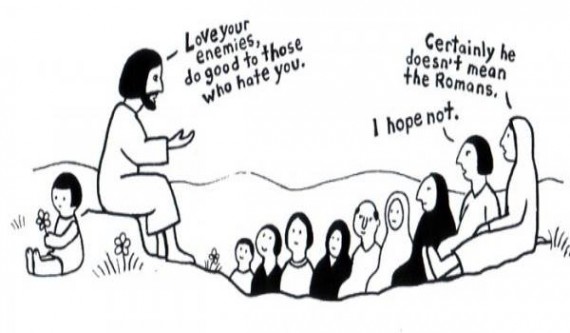
Laugh a Little: Love Your Enemies
[#25] Summary of Genesis 1 – The Redemption of Religion
This is a summary episode for everything we have looked at in Genesis 1–2 so far.
 The reasons for this summary are numerous:
The reasons for this summary are numerous:
- To remind you of what we have seen so far.
- To provide the big picture overview of what we have seen. Sometimes it is easy to miss the forest for the trees, and while my detailed explanations of individual verses are important for the study of Scripture, we don’t want to miss out on the overall theme and focus of Scripture.
- New listeners might get overwhelmed with having to listen to 23 podcast episodes on one chapter of the Bible. If you are new here, these summary episodes can help get you up to speed more quickly. Of course, after hearing the summary, you may want to go back and listen to several of the more detailed episodes to the get the fuller explanation of what these verses mean.
- Even if you have listened to all the other episodes, you will still want to listen to this one, because in this episode I tie together all the strands and themes that we have looked at so far and present you with the overall big picture truth.
In this Discussion of Genesis 1 we look at:
- How Christmas, Easter, the cross, and the Gospels helps us understand Genesis 1
- The truth that redemption is a key theme in Scripture
- A summary of how Moses interacts with the religions of his day
- How God sought to redeem the religions of Moses’ day
- How God can also redeem our own religion – especially the Christian religion
Resources:
- Subscribe to my Newsletter and get updates about books and events
- Subscribe and Leave a Review on iTunes
Downloadable Podcast Resources
Those who are part of my online discipleship group may download the MP3 audio file for this podcast and view the podcast transcript below.
You must join a discipleship group or login to download the MP3 and view the transcript.
Thanks for visiting this page ... but this page is for Discipleship Group members.
If you are already part of a Faith, Hope, or Love Discipleship Group,
Login here.
If you are part of the free "Grace" Discipleship group, you will need to
Upgrade your Membership to one of the paid groups.
If you are not part of any group, you may learn about the various groups and their benefits here:
Join Us Today.

Do you like learning about the Bible online?
Do you like learning about Scripture and theology through my podcast? If so, then you will also love my online courses. They all have MP3 audio downloads, PDF transcripts, quizzes, and a comment section for questions and interaction with other students.
If you want to deepen your relationship with God and better understand Scripture, take one (or all) of these courses. They are great for personal study or for a small group Bible study.
You can see the list of available courses here, and if you join the Discipleship group, you can take all the courses at no additional cost. Go here to learn more and join now.
What is the Gospel? (Give me your best definition)
I am writing a book on the gospel, and want your input.
Specifically, I would love your definition of “the gospel.”

In the comment section for this post, answer the following question:
What is the gospel?
Ready? Go! (And along with the comment section check out the course below to see how others have defined the gospel.)
 Want to learn more about the gospel? Take my new course, "The Gospel According to Scripture."
Want to learn more about the gospel? Take my new course, "The Gospel According to Scripture."
The entire course is free for those who join my online Discipleship group here on RedeemingGod.com. I can't wait to see you inside the course!
[#24] Genesis 1 Q&A
As we worked our way through Genesis 1 and the first creation account in Genesis, numerous people sent in questions about what they were learning.
Before we move on in our study of Scripture, I wanted to take an episode to answer some of these questions. I have already personally answered most of the questions sent in to the people who sent them, but I figured I would ask and answer these questions in a podcast episode as well since you might have similar questions.
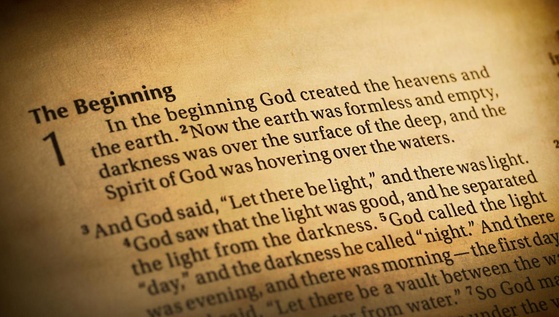
To ask your own questions on future episodes, feel free to comment on the blog post of any episode, contact me through the contact form, message me on Facebook, or send me an email.
Here are some links I referenced in this episode:
- Hamilton, Genesis 1–17 – Amazon or CBD
- Hasel Article on Genesis 1
- Johnston Article on Genesis 1
- Miller and Soden, In the Beginning – Amazon or CBD
- Walton, Lost World of Genesis One – Amazon or CBD
- Wenham, Genesis – Amazon or CBD
- Nobody Believes the Bible – Not Even You
- What Genesis 1 says about death before the fall
- Subscribe to my free email newsletter
Stop Eating Meat or You’ll Go to Hell!
“You shouldn’t eat beef. It is forbidden by the ancient holy books, the Vedas. If you eat beef you will suffer eternal punishment.”
If my Hindu friend told me that, I would think it strange. Why? Because I’m not a Hindu, and don’t follow the teachings and beliefs of Hinduism. Since I am not Hindu, I do not believe that the commands of the Vedas apply to me.

The same is true for you. If you are not Hindu, you probably sense no need or desire to follow the teachings of the Hindu Vedas, and would probably be somewhat offended if a Hindu tried to force their beliefs and practices upon you.
But let’s turn this around.
Why do we Christians expect non-Christians to follow the teachings of the Bible?
Why should we expect people who are not Christians to think that Christian beliefs apply to them?
Why would they think that our holy book, the Bible, is anything more than a collection of ancient writings that has little or nothing to do with them?
 Hopefully, you have some friends who are not Christians. If you do, most of those friends probably do not agree with all of the Christian beliefs and practices. Since they’re not Christians, they don’t think the teachings, beliefs, and moral values of Christianity apply to them.
Hopefully, you have some friends who are not Christians. If you do, most of those friends probably do not agree with all of the Christian beliefs and practices. Since they’re not Christians, they don’t think the teachings, beliefs, and moral values of Christianity apply to them.
Of course, they probably also see that many of the people who self-identify as Christians do not act as if the teachings of Jesus or the Bible apply to Christians either. As one of our friends said, “It’s something they like to spout off about. They want to tell me how to live my life, but they don’t follow their own rules. They say ‘hate the sin, love the sinner.’ I get it that they’re calling me a sinner. I also get it that they don’t love me. The only ones they’re fooling into believing that they love me is themselves.”
A well-respected businessman in the city in which we live, upon hearing someone in a group of about a dozen people say something that indicated we are Christians, immediately blurted out “You can’t be Christians. They hate us, but you love us.” Everyone else in the group, including an atheist, immediately agreed.
Do Christians Really Care?
I think even most people who are not Christians think that Christians do not love them or care about them. Why is that? Let’s allow some of our friends to speak to that issue:
“Jesus told them to love other people. Instead they judge other people. They think God appointed them to judge me because I don’t live by their rules. Why should I? It’s their rules, not mine.”
“Most church people don’t want to have anything to do with us. The ones who do are doing it to make them feel good about themselves. They don’t really care about us.”
“They all have an agenda. Do they think they get points with God for converting someone?”
“Religion is all about politics. They’re pushing their political agenda.”
“It’s a weird religion. They do stuff their religion says they shouldn’t do. Then they tell me not to do the same stuff because they feel guilty about what they’re doing. That seems to make them feel better about what they’re doing.”
“Everyone needs a crutch. Their religion is their crutch. Religion is not my crutch. I don’t need their religion.”
“They give a few dollars to some group that claims they’re fighting the evils of (fill in the blank with words like homelessness, drinking, drug addiction, prostitution, homosexuality) because they feel guilty, but they’re afraid to come near us. Or they don’t care enough to come near. Do you think we ever see them or their money? That money never makes it to us. Those people (the groups who receive the money) spend it on their own paychecks.”
My wife and I have heard every one of those sentiments and variations of them expressed dozens, sometimes hundreds, of times. Clearly, many people have a low opinion of Christians.
If you’ve read some of the other posts I’ve written in the past, you probably know that we have hundreds of homeless friends. We have hundreds of gay friends. We know hundreds of our neighbors and are friends with many of them. Which of these people have said the things above about Christians? All of them. People from every group: from the drunk lying on the sidewalk, the meth addict, and the prostitute, to the people I rarely mention, the college professor, the doctor, the attorney, the scientist and many others.
Accidentally Doing What Jesus Says
I’m a slow learner. I tried everything religion told me to do. I invited people to church. I headed church committees. I worked part time at a church. I witnessed. I told people what the Bible says. I cooked church dinners for thousands of people. I heard lots of whining. I heard lots of complaining. Few really cared what the Bible said. They did what they pleased, not just the “sinners”, but also the church people. Something was missing.
Almost by accident we started doing what Jesus said. Love God and neighbor. Who would have thought we should do that? Apparently no church we ever attended. It’s right there in the Bible, but we never heard anyone teach it. We never heard a sermon preached about it. We rarely saw anyone doing it. We rarely heard about anyone who really did it. Well, maybe Mother Theresa, but that was like her own personal thing or something.
“I’ve been living on the street for over ten years. I’ve watched all the people and groups who come and go down here. They all have an agenda. Usually it’s trying to get us to sign up for their religion, or they’re doing their annual do-a-good-deed to make them feel better about themselves. I’ve been watching the three of you for years, trying to figure out your agenda. You don’t have one do you? You’re the only people I’ve ever seen who don’t have an agenda.”
“You’re right,” I replied. “We have no agenda. We come because we love people.”
“I knew it!” she replied.
We’ve had many similar conversations. Once our friends know we care, that we love them, the relationship changes, in good ways. We talk about what is really going on in their lives and ours. We learn about each other and from each other. We’re frequently asked questions about why we do what we do, and questions about God and Jesus. Many people don’t care much for “Christians,” but are very curious about Jesus and people who act like Jesus.
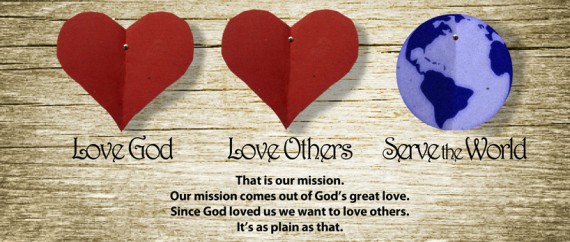
I’m a slow learner. But I have finally learned that doing what Jesus said, loving others, is the way to live my life. I don’t need to tell people what they’re doing wrong, what my religion has to say about it, or quote Bible verses to them (most of them have already heard those verses many times), try to argue theology with them, avoid them or pretend to like them. (Everyone knows it’s pretending. Okay, my wife has a story about one person who fell for that. When she tells the story in any group, everyone thinks it’s funny.)
We love people and try to show it. If it’s genuine, most people figure it out almost immediately. We try to do what Jesus said. We try to love others with the love of Jesus, which points both us and them to Jesus.
The rest is up to God. Only God can convince them that if a person can love them in spite of anything and everything, then maybe God loves them too. Only God can help them realize “God does love me!”
So how then should we live? Well, it’s as Jesus said: “Love God with all your being” and “love your neighbor as yourself.”
It’s so simple, and yet so difficult for most of us to do.
[#23] Genesis 2:1-3 (Part 2) – Liberating God from the Sabbath Rest
This is Part 2 of our study of Genesis 2:1-3, which is the seventh day of the creation week and the day on which God rested from His work.
In Part 1, we looked at the text itself and considered various key terms and issues in this text, and also began to show how this text serves as a theological polemic against some of the religions in the days of Moses.
I left you with a cliffhanger at the end of the show, and that is where we pick up in this episode.
This study of Genesis 2:1-3 reveals something regarding the Sabbath which you have likely never heard before. If you listen, you will hear something regarding the Sabbath that will likely liberate you from all the religious rules and regulations you worry about regarding the Sabbath.
This study of Genesis 2:1-3 will liberate you from Sabbath bondage. Your Sabbath observance will be liberated from the shackles of religion, and will be brought back into the way God intended it to be. By the end of today’s show, you will be excited to observe the Sabbath, because you will be invited to observe it as God Himself does.

The Text of Genesis 2:1-3
Thus the heavens and the earth, and all the host of them, were finished.
And on the seventh day God ended His work which He had done, and He rested on the seventh day from all His work which He had done. Then God blessed the seventh day and sanctified it, because in it He rested from all His work which God had created and made.
In this discussion of Genesis 2:1-3 we look at:
- How God invited the Israelites to enter into their rest.
- How the Israelites would have understood God’s rest in Genesis 2:1-3.
- Why this text is clearly a temple inauguration text.
- Why God’s rest is not the cessation of activity, but the beginning of real activity
- How we can participate with God in His restful ruling of this world.
Resources:
- Heidel, Babylonian Genesis – Amazon
- Walton, Lost World of Genesis One – Amazon or CBD
- Theology.fm – Helping you and your Theology Look Like Jesus
- Subscribe and Leave a Review on iTunes
Downloadable Podcast Resources
Those who are part of my online discipleship group may download the MP3 audio file for this podcast and view the podcast transcript below.
You must join a discipleship group or login to download the MP3 and view the transcript.
Thanks for visiting this page ... but this page is for Discipleship Group members.
If you are already part of a Faith, Hope, or Love Discipleship Group,
Login here.
If you are part of the free "Grace" Discipleship group, you will need to
Upgrade your Membership to one of the paid groups.
If you are not part of any group, you may learn about the various groups and their benefits here:
Join Us Today.

Do you like learning about the Bible online?
Do you like learning about Scripture and theology through my podcast? If so, then you will also love my online courses. They all have MP3 audio downloads, PDF transcripts, quizzes, and a comment section for questions and interaction with other students.
If you want to deepen your relationship with God and better understand Scripture, take one (or all) of these courses. They are great for personal study or for a small group Bible study.
You can see the list of available courses here, and if you join the Discipleship group, you can take all the courses at no additional cost. Go here to learn more and join now.
A Lesson from World War I that could maybe be applied to ISIS?
I recently read the following in J. Denny Weaver’s book, The Nonviolent God (p. 220):
When the hour arrived for the end of Word War I, Winston Churchhill and his wife went to Downing Street to congratulate Lloyd George, the prime minister. Churchill interrupted a meeting already in progress and suggested that since the “fallen foe” was close to starvation, they should send “a dozen great ships crammed with provisions” to Hamburg. The suggestion received a cold rebuff.
Six years later a German soldier described his feelings at the time and wrote that “only fools, liars, and criminals could hope for mercy from the enemy.” His hatred grew for those responsible for the suffering. On observing the great misery [in Germany], he wrote, “My own fate became known to me … I resolved to go into politics.”
That soldier was Adolph Hitler.
 Critics of nonviolence often use Adolph Hitler as an example of a time when violence and bloodshed was absolutely necessary. They say, “So if you had a chance to go back in time and kill Hitler and save millions of innocent Jews, you wouldn’t do it?”
Critics of nonviolence often use Adolph Hitler as an example of a time when violence and bloodshed was absolutely necessary. They say, “So if you had a chance to go back in time and kill Hitler and save millions of innocent Jews, you wouldn’t do it?”
What the question fails to recognize is that there were good ways of stopping Hitler that did not involve killing him. One wonders if there ever would have been a Nazi Germany and a World War II if Winston Churchill’s advice had been heeded.
Similarly, one wonders if Winston Churchill’s suggestion could help the West in our struggle with radical Islam and ISIS.
Recent estimates put the cost of the recent wars in Iraq and Afghanistan at somewhere between $4 and $6 Trillion.
If that isn’t appalling enough, in our efforts to retaliate against the horrible tragedy of the murder of 2,753 people in the Word Trade Center on 9/11/2001, we sent our young men and women overseas, and so far, 4,486 U.S. soldiers have died in Iraq and 2,345 U.S. soldiers have died in Afghanistan, with tens of thousands of soldiers being injured or wounded. And this is nothing compared to the casualties among the people of Iraq and Afghanistan.
Looking back, is it possible that there might be a better way to defeat Isis and radical Islamic terrorists … a way that would have spent less money and fewer (if any) lives? What would Iraq and Afghanistan look like today if we had followed Churchill’s advice in the wake of World War I, and had sent boatloads of food and construction crews to the Middle East to prop up their economy and give their people an education?
The annual GDP of Iraq is just over $200 Billion. Afghanistan is about $60 billion. Imagine what the two countries might look like today if we had spent $4 Trillion building those nations up instead of bombing them down?
 When it comes to stopping Islamic terrorists, I sometimes think a Wal-Mart in Baghdad would work better than bombs.
When it comes to stopping Islamic terrorists, I sometimes think a Wal-Mart in Baghdad would work better than bombs.
“Oh … But you can’t export capitalism into the Middle East! They will rise up in rebellion.”
Maybe. But if your choices are between a Wal-Mart and bombs, are you really going to choose bombs?
I am not saying this would have “worked,” … but then, is what we are doing now really “working”?
I am not a politician, and I know these are difficult issues, but I just sometimes wonder when the world is going to wake up and realize the truth that that violence always and only leads to more violence. In trying to defeat violence with violence you become like the enemy you seek to defeat.
Are you looking for a good commentary on 1-2 Chronicles? Seriously?
When was the last time you seriously studied through 1-2 Chronicles?
Yeah. I thought so. Me too. (Answer: Never)
 But if all Scripture is “God Breathed,” then these books also deserve our attention and study.
But if all Scripture is “God Breathed,” then these books also deserve our attention and study.
So I was thrilled to recently receive a review copy of Eugene Merrill’s commentary on these books. And it is a great commentary! I can safely say that it is the best commentary on 1-2 Chronicles I have ever read. Okay, okay … this is because I have never read a commentary on 1-2 Chronicles before, but this does not detract from the value of this present volume.
One of the things I look for most in commentaries is the ability to explain the text in an understandable way while at the same time making the message of the text applicable and pertinent to our time today. Eugene Merrill’s commentary does this well.
He not only provides detailed explanations of the text all the way through (which providing lots of footnotes for those who want to research in more depth), but he also provides theological asides that help the student of Scripture see how the book influences our life and thinking today.
If you are thinking of preaching or teaching through 1-2 Chronicles let me say two things: First, good for you! That’s very courageous. Second, make sure this commentary by Merrill is one of the sources you use in your study.
The Story of the Bible Retold
Part of the problem with the Bible is that since it is written in an ancient format, people have trouble reading and understanding it. So I always love reading books that make the Bible come to life.
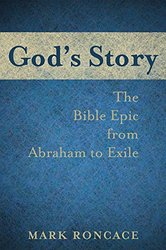 One such book is God’s Story by Mark Roncace. This book presents the biblical narrative from the time of Abraham to the time of the Exile in a story format which is both engaging and insightful. As I read it, I found myself seeing new things about the text which I had never seen before, and nodding with agreement at how Mark brought out some of the cultural and historical background details which are so important to properly understanding the biblical story.
One such book is God’s Story by Mark Roncace. This book presents the biblical narrative from the time of Abraham to the time of the Exile in a story format which is both engaging and insightful. As I read it, I found myself seeing new things about the text which I had never seen before, and nodding with agreement at how Mark brought out some of the cultural and historical background details which are so important to properly understanding the biblical story.
One of the most interesting features of the book is that Mark doesn’t shy away from the violence in the biblical account. As I have been writing a lot about the violence in Scripture these past several years, I am always shocked to interact with Christians who seem completely oblivious to all the violence in the Bible. This book by Mark Roncace does not emphasize or focus in on the violence, but doesn’t try to hide it either, and simply by reading the Bible as a narrative, one is able to see the common occurrence of violence in a way that a “familiar” reading of Scripture tends to hide.
If you are looking for a retelling of the Biblical story in a way that helps you see the Bible as a story, try reading God’s Story by Mark Roncace.
[#22] Genesis 2:1-3 (Part 1) – The Sabbath Rest of God
Do you observe the Sabbath? Why or why not?
Lots of people struggle with whether or not we should observe the Sabbath. On the one hand, Sabbath observance seems like a very religious and legalistic thing to do, but on the other hand, God set up the Sabbath as an everlasting covenant (Exod 31:16).
This episode begins to look at Genesis 2:1-3 and Day 7 of the creation week as we begin to answer these important questions.

The Text of Genesis 2:1-3
Thus the heavens and the earth, and all the host of them, were finished.
And on the seventh day God ended His work which He had done, and He rested on the seventh day from all His work which He had done. Then God blessed the seventh day and sanctified it, because in it He rested from all His work which God had created and made.
In this discussion of Genesis 2:1-3 we look at:
- The last day of Creation, Day 7
- How Moses used this day to set Yahweh apart from other gods
- Why Moses doesn’t actually use the word for “Sabbath”
- Why Moses presents God as needing to rest
Resources:
- Going Against the Grain on the Sabbath
- Jesus Gives a Hand on the Sabbath
- Johnston Article on Genesis 1
- Hamilton, Genesis 1–17 – Amazon or CBD
- Hess Article on Genesis 1–2
- Heidel, Babylonian Genesis – Amazon
- Kuruvilla, Genesis – Amazon or CBD
- Miller and Soden, In the Beginning – Amazon or CBD
- Sailhamer, EBC: Genesis – Amazon or CBD
- Sarna, Understanding Genesis – Amazon or CBD
- Walton, Lost World of Genesis One – Amazon or CBD
- Walton, Ancient Israelite Literature – Amazon
- Wenham, Genesis – Amazon or CBD
- Theology.fm – Helping you and your Theology Look Like Jesus
- Subscribe and Leave a Review on iTunes
Downloadable Podcast Resources
Those who are part of my online discipleship group may download the MP3 audio file for this podcast and view the podcast transcript below.
You must join a discipleship group or login to download the MP3 and view the transcript.
Thanks for visiting this page ... but this page is for Discipleship Group members.
If you are already part of a Faith, Hope, or Love Discipleship Group,
Login here.
If you are part of the free "Grace" Discipleship group, you will need to
Upgrade your Membership to one of the paid groups.
If you are not part of any group, you may learn about the various groups and their benefits here:
Join Us Today.

Do you like learning about the Bible online?
Do you like learning about Scripture and theology through my podcast? If so, then you will also love my online courses. They all have MP3 audio downloads, PDF transcripts, quizzes, and a comment section for questions and interaction with other students.
If you want to deepen your relationship with God and better understand Scripture, take one (or all) of these courses. They are great for personal study or for a small group Bible study.
You can see the list of available courses here, and if you join the Discipleship group, you can take all the courses at no additional cost. Go here to learn more and join now.
- « Previous Page
- 1
- …
- 35
- 36
- 37
- 38
- 39
- …
- 243
- Next Page »


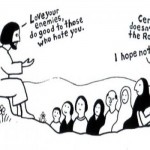
![[#25] Summary of Genesis 1 – The Redemption of Religion](https://redeeminggod.com/wp-content/uploads/2016/01/Genesis_1_summary-150x150.jpg)

![[#24] Genesis 1 Q&A](https://redeeminggod.com/wp-content/uploads/2016/01/Genesis1-150x150.jpg)

![[#23] Genesis 2:1-3 (Part 2) – Liberating God from the Sabbath Rest](https://redeeminggod.com/wp-content/uploads/2016/01/enjoy-life-150x150.jpg)



![[#22] Genesis 2:1-3 (Part 1) – The Sabbath Rest of God](https://redeeminggod.com/wp-content/uploads/2015/09/One-Verse-Podcast-Jeremy-Myers-150x150.jpg)
